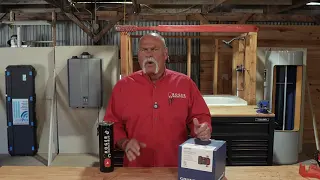If you’re deciding between a plumbing career or entering the world of HVAC, you’ve probably asked yourself: “Who makes more money?” Both trades are in high demand, with the promise of great pay, job security, and exciting work environments. The truth is, you can earn a substantial income in either field—sometimes into the six-figure range and beyond—if you commit to honing your skills and taking advantage of opportunities for advancement. In this post, you’ll hear straight talk from seasoned professionals about how to get started, what the career paths look like, how pay structures work (including commissions), and which trade might suit you best.
How to Get Started in Plumbing
Know Your Path (Residential vs. Commercial)
Plumbing offers two major paths:
• Residential service: You’ll repair water heaters, unclog drains, fix toilets, and handle day-to-day household plumbing issues. Most smaller companies specializing in home service hire apprentices who start with basic tasks like hauling equipment, cutting pipe, or cleaning the shop.
• Commercial construction: Larger projects like hospitals, skyscrapers, or manufacturing plants may use union contractors or big open-shop mechanical companies. You’ll learn to install brand-new systems, read blueprints, and work on heavy-duty piping under a foreman’s supervision.
Union vs. Open Shop
If you aim for commercial plumbing, consider joining a union. Unions typically offer a clear pay scale and structured apprenticeship with incremental raises. You might start at about 45–50% of journeyman scale, with set raises every six months or year. Open shop companies also hire apprentices, but pay and training can vary widely. Whichever you pick, confirm they provide good on-the-job guidance, stable job sites, and a path to licensure.
Essential Interview Questions
Ask potential employers:
• Do you provide regular training or apprenticeships?
• Is there a mentorship program or a clear path for learning?
• How quickly can I move from apprentice to journeyman?
• Will you cover the cost of any licensing exams or classes?
If you hear crickets about training, you might be stuck learning everything on your own. That’s no fun—and can stifle your progress.
Climbing the Career Ladder (Licenses)
In many states, including Texas, plumbing apprentices progress through these licenses:
• Apprentice: Registered to learn under a licensed plumber.
• Tradesman: Allows work on single-family or two-family dwellings.
• Journeyman: Can handle a full range of plumbing tasks under a master’s supervision.
• Master: Oversees other plumbers, sets up contracts, and may open a business.
• Responsible Master Plumber (RMP): In states like Texas, this is required if you want to operate a plumbing company.
At each level, you prove skills and rack up hours. A successful plumber might earn well over $100,000 a year—especially in a commission-based service role. Top-tier residential service plumbers have been known to make $150k, $200k, or even $300k if they work long hours and excel at sales.
How to Get Started in HVAC
Similar Entry Points
HVAC shares many parallels with plumbing. To break in, you can:
• Start as a parts runner: Learn equipment and materials quickly so you know which parts go with which repairs.
• Hire on as an apprentice: Larger HVAC companies often have in-house training, letting you shadow experienced techs.
• Union or open shop: Unions in some regions offer a structured apprenticeship with standard wage progression. Open shops might have different setups, but the basic idea is to learn on the job.
EPA Certification
While plumbing requires local or state licenses, HVAC typically demands an EPA certification if you plan to handle refrigerants. After that, you might pursue specialized training for advanced systems or controls. As in plumbing, a motivated learner can quickly move from helper to technician, or pivot into installation or commercial projects.
Interview Questions for HVAC
• What type of training do you provide for entry-level techs?
• Do you have a commission or hourly pay structure—or both?
• Will you help me get or maintain my EPA certification?
• Is there a path to become a lead installer, service tech, or comfort advisor?
Comparing Pay Structures
Hourly vs. Commission
Both plumbing and HVAC companies often use commission-based pay for service technicians. You might earn an hourly base plus a percentage of the job’s total revenue. Commission can skyrocket earnings if you excel at diagnosing problems, offering solutions, and building trust with customers. However, some folks prefer a stable hourly wage, especially when they’re starting out.
Residential Service vs. New Construction
• Residential Service: Typically higher earning potential if you’re good at sales. You offer premium services to homeowners, and your commissions can add up. But you might work irregular hours, handle emergency calls, and deal with messy situations (in plumbing) or urgent no-cool calls (in HVAC).
• Commercial Construction: Often more stable hours, union pay scales, and typically no direct sales. You won’t earn large commissions, but you might get high hourly wages with union benefits. Over time, your wage might surpass many residential roles—though the top commission-driven service pros often out-earn them.
Maximum Possible Earnings
• Plumbers: Great service plumbers, especially in large cities, can bring home $150k to $350k if they’re extremely skilled, work extended hours, and consistently upsell.
• HVAC: Top-tier HVAC service techs might earn $150k to $200k. Elite sellers or “comfort advisors” can hit $300k to $500k if they excel in sales and the company provides high-quality leads.
It’s not typical to earn that much in your first few years. But for go-getters who take training seriously, those numbers are within reach.
Which Career Path Fits You Best?
Consider Plumbing If You:
• Don’t mind occasional (or frequent) “dirty work” like clearing sewer lines.
• Like the idea of a variety of tasks: water heaters, gas lines, fixture installs, leaks, etc.
• Appreciate a licensing system that’s well-structured, especially in states like Texas.
• Are comfortable with upselling in a home-service environment or want to tackle huge commercial projects.
Consider HVAC If You:
• Enjoy working with mechanical systems, electricity, and refrigerants.
• Want to master diagnosing airflow, thermostats, furnaces, AC units, heat pumps, or commercial chillers.
• Love the challenge of combination mechanical and electrical problems.
• Like the idea of upselling in-home or focusing on new installs of big systems.
Both Offer:
• High demand: Both plumbing and HVAC are trades starved for talent.
• Path to business ownership: Plenty of top pros eventually open their own shops.
• Union or open shop routes.
• Potential for management, project supervision, or office roles (like estimator, CAD operator, or operations director).
Tips for Success
- Choose a Great Employer: Look for a company that invests in training, mentorship, and a clear career ladder.
- Learn Sales Skills: Even if you focus on new construction, being able to communicate well helps you stand out. In service, good sales can double or triple your paycheck.
- Develop Technical Expertise: Especially in mechanical or advanced plumbing fields, top earners are often the most knowledgeable troubleshooters.
- Diversify Your Skills: Don’t get stuck only doing water heaters or only changing filters. Seek opportunities to learn everything from medical gas plumbing to high-end zoning systems.
- Stay Professional: Show up on time, do quality work, and treat customers kindly. Reputation is everything in these trades—both for promotions and commissions.
Final Word: Who Makes More?
Plumbers vs. HVAC technicians? The real answer: either can make a fortune. The best in both fields easily crack six figures, with top-tier service pros sometimes earning well beyond $200k. In general, plumbers might face more physically dirty tasks (especially in sewer repair), but can upsell big-dollar jobs like major water line replacements. HVAC techs do heavier mechanical work, handle electricity and refrigerants, but can score large replacement sales.
Ultimately, your pay depends on your location, your willingness to learn, the market demand, and—most importantly—your hustle. If you love diagnosing mechanical systems, dealing with motors and refrigerants, HVAC might be your calling. If you’re drawn to the intricacies of water, gas lines, and everything from faucets to full re-pipes, plumbing awaits. Either path can lead you to an impressive income if you commit to being the best in your craft.




